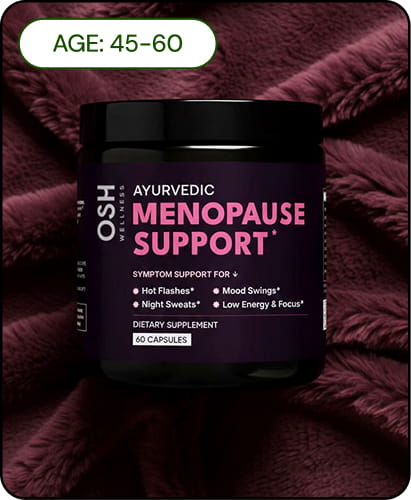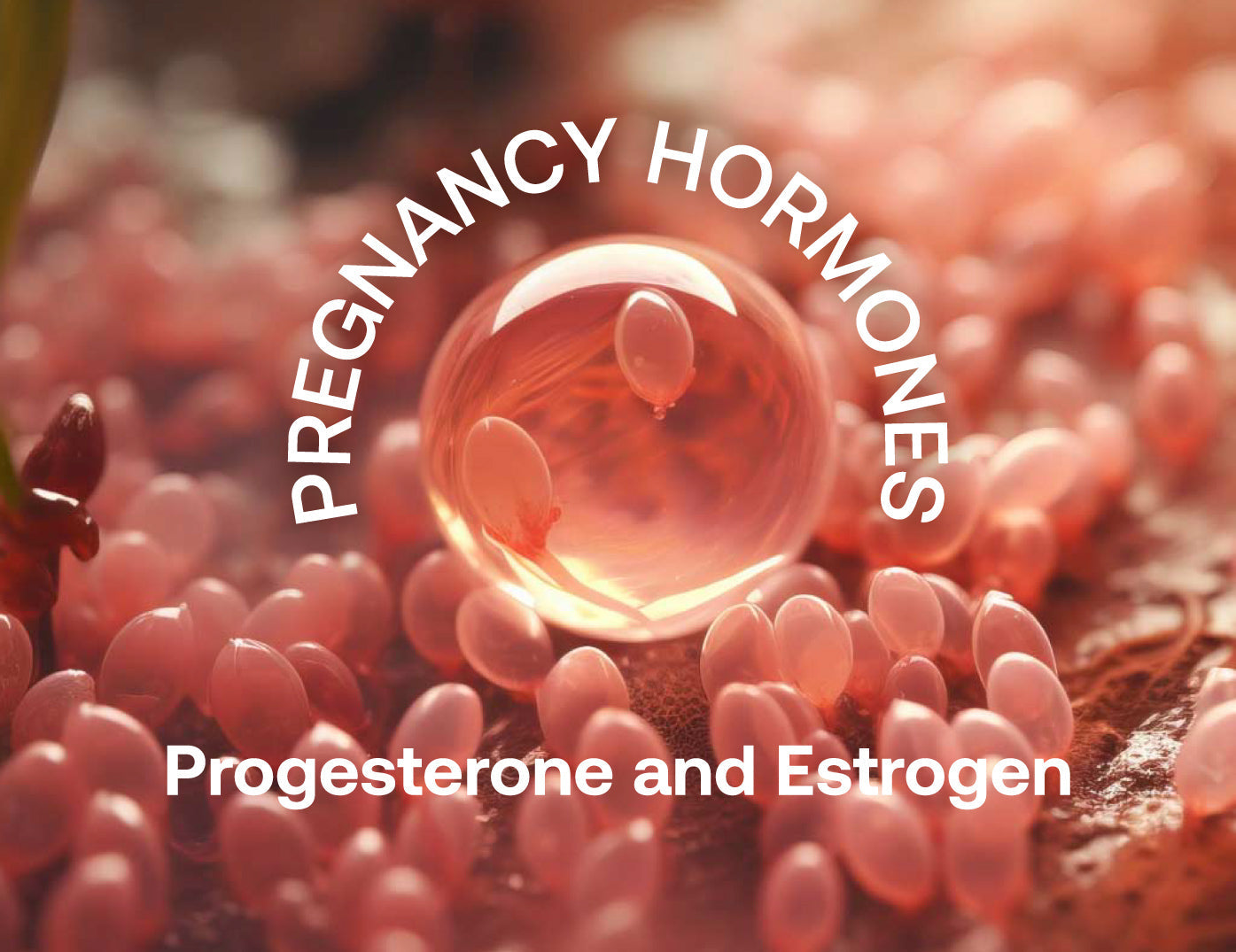Table of contents
Progesterone and estrogen are pivotal hormones in the female reproductive system, orchestrating a range of functions from menstrual cycle regulation to pregnancy maintenance. An in-depth understanding of these hormones can provide valuable insights into their roles in fertility and overall reproductive health.
What Are Progesterone and Estrogen?

Progesterone and estrogen are crucial to reproductive health. They regulate the menstrual cycle, support mood balance, and are essential for maintaining a pregnancy.
Progesterone: The Pregnancy Sustainer
Progesterone, often termed the “pregnancy hormone,” plays a crucial role in preparing and maintaining the uterus for pregnancy. After ovulation, the corpus luteum secretes progesterone, which thickens the endometrium (uterine lining), creating an optimal environment for a fertilized egg to implant. If conception occurs, progesterone levels remain elevated to support the developing embryo and prevent uterine contractions that could lead to miscarriage.
A study published in Gynecological Endocrinology emphasized the importance of progesterone in early pregnancy. The researchers concluded that adequate progesterone levels are essential for embryo implantation and the prevention of early pregnancy loss.
Estrogen: The Cycle Regulator
Estrogen is integral to the menstrual cycle and reproductive health. Produced primarily by the ovaries, estrogen regulates the menstrual cycle, promotes the growth of the uterine lining during the follicular phase, and supports the maturation of the ovarian follicles. Additionally, estrogen enhances the production of cervical mucus, facilitating sperm movement and increasing the likelihood of fertilization.
Beyond reproduction, estrogen has systemic effects, including maintaining bone density, modulating cholesterol levels, and influencing mood and cognitive functions. Its vascular actions are also noteworthy; estrogen contributes to vasodilation and has protective effects on the cardiovascular system.
There are three types of estrogen -- estradiol, estrone, and estriol. Estradiol is the most common in the body before you enter menopause as it helps your reproductive system mature and function. During pregnancy, the placenta produces estriol. After menopause, your ovaries stop producing estradiol and estrone is produced in fat (adipose) tissue.
Studies have shown that both too little (hypo) or too much (hyper) estrogen has been linked to fertility and pregnancy complications along with acute and chronic diseases.
Hormonal Imbalances and Their Impact on Fertility

The delicate balance between progesterone and estrogen is vital for reproductive health. Disruptions in this balance can lead to various issues:
• Estrogen Dominance: When estrogen levels are disproportionately high relative to progesterone, it can result in symptoms such as irregular menstrual cycles, heavy bleeding, and an increased risk of conditions like endometriosis and uterine fibroids.
• Estrogen Deficiency : Primary ovarian insufficiency (POI) which is characterized by low estrogen results in a loss of oocytes (an immature egg cell) and infertility. Low estrogen in general can impact egg maturity, reducing the number of eggs available to be fertilized and affect the uterine lining, making it difficult for a fertilized egg to implant.
• Progesterone Deficiency: Low progesterone levels can lead to luteal phase defects, where the uterine lining is inadequately prepared for implantation, increasing the risk of infertility and early miscarriage.
A systematic review and meta-analysis in Frontiers in Endocrinology highlighted that low luteal serum progesterone levels are associated with lower ongoing pregnancy and live birth rates in assisted reproductive technologies (ART). Additionally, a 2020 study of women undergoing in vitro fertilization (IVF) found that high estrogen levels could reduce pregnancy rates by disrupting the implantation of the embryo. Estrogen and progesterone each need to maintain adequate levels to support fertility and pregnancy.
What Causes Hormonal Imbalances?
Irregular levels of estrogen or progesterone can occur for different reasons. Menopause and pregnancy can cause these levels to fluctuate, but this is considered normal and natural. However, other conditions aside from pregnancy, perimenopause, and menopause can cause hormonal imbalances.
Including:
Insulin resistance
Polycystic ovarian syndrome (PCOS) Imbalanced gut microflora
Obesity
Excessive dieting or exercise
Genetic conditions
Damage or removal of the reproductive system
Autoimmune conditions
Treatments like chemotherapy
Recognizing Hormonal Imbalances
Identifying hormonal imbalances is crucial for timely intervention. Common signs include:
• Menstrual Irregularities : Irregular or absent periods can indicate hormonal disruptions.
• Mood Fluctuations : Hormonal imbalances can lead to mood swings, irritability, or depression.
• Physical Symptoms : Symptoms such as unexplained weight changes, acne, and fatigue may be linked to hormonal issues.
If these symptoms are present, consulting a healthcare provider for hormonal evaluation is recommended.
How are Hormonal Imbalances Diagnosed?
If you believe you have a hormonal imbalance, it's important to begin tracking your symptoms. Then, you can meet with your healthcare provider to discuss your concerns. While some doctors may find symptom tracking to be adequate for a diagnosis, others may want to do testing to rule out underlying causes. They may recommend blood tests or imaging tests. These diagnostics can be especially helpful if you are experiencing infertility or recurrent miscarriages.

Natural Approaches to Hormonal Balance
Several natural strategies can support hormonal equilibrium:
• Dietary Modifications: Incorporating phytoestrogen-rich foods like soy, flaxseeds, and chickpeas may help modulate estrogen levels. A balanced diet rich in leafy greens, nuts, and seeds provides essential nutrients for hormone production.
• Lifestyle Changes: Regular physical activity, stress management techniques, and adequate sleep are crucial for hormonal health.
• Herbal Supplements: Ayurvedic herbs such as Shatavari and Chaste Tree Berry (Vitex) have been traditionally used to support female reproductive health. Shatavari is believed to balance estrogen levels, while Vitex may promote progesterone production and regulate menstrual cycles.
It’s important to consult with a healthcare provider before starting any herbal supplements to ensure safety and appropriateness.

Medical Interventions
In cases where natural methods are insufficient, medical interventions may be necessary:
• Hormone Replacement Therapy (HRT) : HRT can be used to restore hormonal balance, particularly in menopausal women. However, it’s essential to consider the benefits and risks, as some studies have linked certain types of HRT to an increased risk of breast cancer. Clinical trials in 2018 reported that when progesterone medication was given to women with recurrent miscarriages early in their pregnancy, it lowered the miscarriage rate from 27.5% to 20.1%, highlighting the importance of adequate hormone levels during conception and early pregnancy.
• Fertility Treatments : For individuals facing infertility due to hormonal imbalances, treatments such as in vitro fertilization (IVF) may be considered. Monitoring and adjusting hormone levels are integral components of these procedures.
Hormonal Imbalances Can Be More Than Just Irritating
Progesterone and estrogen are fundamental to female reproductive health, influencing everything from menstrual regularity to the health and success of a pregnancy. Understanding their roles and recognizing the signs of imbalance is essential, especially if you want to start a family. Whether through natural lifestyle modifications or medical treatments, achieving hormonal balance is a key step toward optimal reproductive health.
FAQs
Can lifestyle changes significantly impact hormonal balance?
Yes, lifestyle modifications such as a balanced diet, regular exercise, stress management, and adequate sleep can positively influence hormonal health. However, some women may need medical interventions to fully address the cause of their imbalance.
Are herbal supplements effective in balancing hormones?
Some herbal supplements, like Shatavari and Chaste Tree Berry, have been traditionally used to support hormonal balance. However, it’s important to consult with a healthcare provider before starting any new supplement.
What are the risks associated with Hormone Replacement Therapy (HRT)?
While HRT can alleviate menopausal symptoms and improve quality of life, certain types have been associated with an increased risk of breast cancer. It’s important to discuss the benefits and risks with a healthcare provider.
How can I determine if I have a hormonal imbalance?
Symptoms like irregular cycles, mood swings, unexplained weight changes, and acne may indicate a hormonal imbalance. Blood tests measuring estrogen, progesterone, and other reproductive hormones can provide clarity. A healthcare provider can recommend appropriate testing based on your symptoms.
Can low progesterone cause early miscarriage?
Yes, studies suggest that insufficient progesterone levels can lead to early pregnancy loss. Progesterone helps maintain the uterine lining and prevents contractions that could disrupt implantation. Some fertility specialists prescribe progesterone supplements for those with recurrent miscarriages.
Does high estrogen impact fertility?
High estrogen levels can interfere with ovulation and embryo implantation. A 2020 study in Archives of Medical Science found that elevated estrogen levels during frozen embryo transfer cycles were associated with lower pregnancy success rates. Monitoring estrogen levels is critical for those undergoing fertility treatments.
How long does it take to balance hormones naturally?
It depends on the underlying cause. Some individuals may see improvements in a few months with diet, exercise, and stress management, while others with conditions like PCOS or endometriosis may require long-term management and medical intervention.
Sources
- Barbieri RL, Ehrmann DA. Patient Education: Polycystic ovary syndrome (PCOS) (Beyond the Basics). In: Synder PJ, Crowley WF, Martin KA, eds. UpToDate. UpToDate;2023.
- Czyzyk A, Podfigurna A, Genazzani AR, Meczekalski B. The role of progesterone therapy in early pregnancy: from physiological role to therapeutic utility. Gynecol Endocrinol. 2017 Jun;33(6):421-424. doi: 10.1080/09513590.2017.1291615. PMID: 28277122.
- Kumar P, Magon N. Hormones in pregnancy. Niger Med J. 2012 Oct;53(4):179-83. doi: 10.4103/0300-1652.107549. PMID: 23661874.
- Özdemir AZ, Karli P, Gülümser Ç. Does high estrogen level negatively affect pregnancy success in frozen embryo transfer? Arch Med Sci. 2020 Jan 29;18(3):647-651. doi: 10.5114/aoms.2020.92466. PMID: 35591836.
- Patel S, Homaei A, Raju AB, Meher BR. Estrogen: The necessary evil for human health, and ways to tame it. Biomed Pharmacother. 2018 Jun;102:403-411. doi: 10.1016/j.biopha.2018.03.078. Epub 2018 Mar 22. PMID: 29573619.
- Ranisavljevic N, Huberlant S, Montagut M, et al. Low Luteal Serum Progesterone Levels Are Associated With Lower Ongoing Pregnancy and Live Birth Rates in ART: Systematic Review and Meta-Analyses. Front Endocrinol (Lausanne). 2022 Jun 10;13:892753. doi: 10.3389/fendo.2022.892753. PMID: 35757393.








